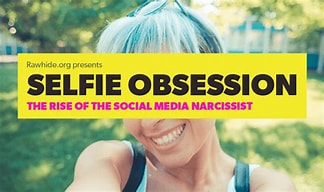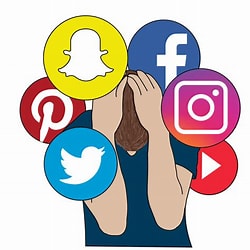Is Social Media Fueling Narcissism?
Introduction
In a world dominated by social media, the way we interact, express ourselves, and perceive our identities has dramatically changed. With platforms like Instagram, TikTok, and Facebook, sharing our lives has become second nature. But as we scroll through endless selfies and curated lifestyles, a pressing question arises: is social media fueling narcissism? Are we witnessing the rise of a self-obsessed generation more concerned with likes and validation than genuine connections? In this article, we’ll dive into the relationship between social media and narcissism, exploring how these platforms may be shaping a culture of self-obsession.
Understanding Narcissism
What is Narcissism?
Narcissism is often characterized by an excessive focus on oneself, an inflated sense of self-importance, and a deep need for admiration. While everyone exhibits narcissistic traits to some degree—especially in moments of insecurity—narcissistic personality disorder is a more severe condition that can impact relationships and mental health.

The Spectrum of Narcissism
Narcissism exists on a spectrum. On one end, you have healthy self-esteem, where individuals recognize their worth without needing constant validation. On the other end lies pathological narcissism, where individuals exhibit grandiosity, entitlement, and a lack of empathy. Social media often amplifies these traits, making it easier for individuals to seek out admiration while simultaneously fostering feelings of inadequacy in others.
The Role of Social Media
Social Media as a Double-Edged Sword
Social media platforms have revolutionized communication and self-expression. They allow users to share their lives with friends and followers instantly. However, this constant exposure can lead to unhealthy comparisons and validation-seeking behavior. The likes and comments we receive can create a fleeting sense of worth that many chase after relentlessly.
The “Highlight Reel” Effect
One major issue with social media is that it often presents a “highlight reel” of life—showcasing only the best moments while ignoring the mundane or challenging aspects. This selective sharing can distort reality, leading users to believe that everyone else is living an ideal life. Consequently, feelings of inadequacy can arise as individuals compare their everyday struggles to the seemingly perfect lives they see online.
The Rise of the ‘Me Generation’
Who Are the ‘Me Generation’?
The term “Me Generation” refers to younger individuals—particularly Millennials and Gen Z—who are often perceived as self-absorbed or overly focused on personal success. This generation has grown up with social media as a constant presence in their lives, leading to unique challenges regarding identity and self-worth.
The Impact of Instant Gratification
Social media provides instant gratification through likes, shares, and comments. This immediate feedback loop can reinforce narcissistic tendencies as users become addicted to the rush that comes from online validation. The more they receive positive reinforcement, the more they may feel compelled to share content that garners attention.
The Psychological Effects of Social Media on Self-Perception
Validation-Seeking Behavior
Many users engage in validation-seeking behavior by posting content designed to elicit likes and comments. This can lead to an unhealthy cycle where self-worth becomes tied to online approval rather than intrinsic value. Research indicates that individuals who frequently seek validation online may struggle with self-esteem issues when they don’t receive the expected response.

Fear of Missing Out (FOMO)
FOMO is another psychological effect exacerbated by social media. Users often feel pressure to participate in trending activities or showcase their lives in ways that align with popular narratives. This fear can drive individuals to prioritize online personas over real-life experiences and relationships.
How Social Media Fuels Narcissistic Tendencies
Amplifying Grandiosity
Social media platforms can amplify grandiose narcissism by providing users with a stage to showcase their achievements and lifestyles. Those with narcissistic traits may feel empowered to flaunt their successes while downplaying others’ contributions or experiences.
Creating Echo Chambers
Social media algorithms tend to create echo chambers where users are exposed primarily to content that aligns with their beliefs and interests. This can reinforce narcissistic behavior by surrounding individuals with like-minded people who validate their views without challenge.
The Consequences of Social Media-Induced Narcissism
Strained Relationships
Narcissistic tendencies fostered by social media can strain personal relationships. When individuals prioritize online validation over genuine connections, they may neglect friends and family in favor of maintaining their online image. This shift can lead to feelings of isolation and loneliness despite having numerous online connections.

Mental Health Challenges
The pressure to maintain an idealized online persona can contribute to mental health challenges such as anxiety and depression. Individuals may experience heightened stress levels due to constant comparisons or fear of not measuring up to others’ expectations.
Addressing the Issue: Moving Towards Healthy Engagement
Encouraging Authenticity
To combat the rise of narcissism fueled by social media, it’s essential to encourage authenticity in online interactions. Users should be reminded that it’s okay to share struggles alongside successes; this creates a more balanced representation of life.
Setting Boundaries with Social Media Use
Establishing boundaries around social media use can help mitigate its negative effects on mental health. Limiting screen time or engaging in digital detoxes allows individuals to reconnect with themselves outside the realm of online validation.
Promoting Mental Health Awareness
Education on Narcissism
Raising awareness about narcissism—its signs, symptoms, and effects—is crucial for fostering healthier attitudes toward self-worth. By educating people about the dangers of excessive self-focus, we can promote empathy and understanding in our communities.
Support Systems for Vulnerable Individuals
Creating support systems for those struggling with feelings of inadequacy or narcissistic tendencies is vital. This could involve therapy groups or workshops focused on building self-esteem without relying on external validation.
Read This: The Evolution of Fashion Trends: A Look Back at the Last Decade
Conclusion: Finding Balance in a Digital World
As we navigate an increasingly digital world, it’s essential to recognize the impact social media has on our perceptions of ourselves and others. While these platforms offer opportunities for connection and expression, they also present challenges that can fuel narcissistic tendencies.
By promoting authenticity, setting boundaries around social media use, and raising awareness about mental health issues related to narcissism, we can foster healthier relationships both online and offline. Ultimately, it’s about finding balance—embracing our individuality while remaining connected to the world around us without losing sight of what truly matters: genuine human connection.
FAQs
1. Is social media directly causing increased narcissism?
While there is no definitive causal link between social media use and narcissism, studies suggest that excessive engagement with these platforms correlates with higher levels of narcissistic traits.
2. How does FOMO relate to narcissism?
FOMO drives individuals to seek approval through social media participation; this desire for validation can exacerbate narcissistic behaviors as users prioritize their online image over real-life experiences.
3. What are some signs of narcissistic behavior?
Signs include an excessive need for admiration, lack of empathy for others, grandiosity about achievements or talents, and preoccupation with fantasies of success or power.
4. Can social media be used positively?
Yes! When used mindfully, social media can foster connections and support communities; promoting authenticity over perfection helps mitigate its potential negative effects.
5. How can I reduce my reliance on social media for validation?
Consider setting specific times for social media use or engaging in activities that promote self-esteem outside digital platforms; focusing on real-life connections rather than online metrics is key.


